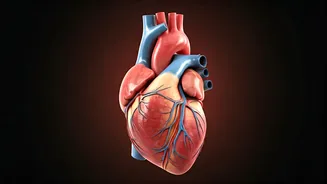Dietary Modifications for Health
Focusing on a heart-healthy diet is a cornerstone of cardiovascular wellness. This involves reducing intake of saturated and trans fats, abundant in processed
foods, fatty meats, and fried items. Instead, emphasize consumption of fruits, vegetables, and whole grains, which are rich in fiber and beneficial nutrients. Incorporate lean proteins like fish and poultry over red meat to lower cholesterol levels. Monitoring portion sizes and maintaining regular meal times are also vital. Substituting unhealthy fats with options like olive oil and avocados can further support heart health. Staying hydrated by drinking plenty of water also assists in overall bodily functions, thereby contributing to better cardiac health.
Regular Physical Activity
Engaging in regular physical activity is essential for promoting a healthy heart. Aim for at least 150 minutes of moderate-intensity exercise, such as brisk walking or cycling, or 75 minutes of vigorous-intensity exercise each week. Physical activity helps improve cardiovascular function by strengthening the heart muscle, lowering blood pressure, and managing weight. Consider incorporating a mix of aerobic exercises, like running or swimming, with strength training, which can help increase metabolism and improve overall body composition. Start gradually and increase the intensity and duration of your workouts as your fitness level improves. Even simple activities like taking the stairs instead of the elevator or going for a short walk during your lunch break can significantly contribute to improved heart health. Consistency is key, so find activities you enjoy and can maintain regularly.
Stress Management Techniques
Chronic stress can negatively impact heart health, so implementing effective stress management techniques is important. Techniques such as mindfulness meditation and deep breathing exercises have proven effective in reducing stress levels and lowering blood pressure. Engaging in relaxing activities, such as yoga, spending time in nature, or listening to calming music, can also help manage stress. Identify the stressors in your life and find healthy ways to cope with them, such as setting boundaries at work or seeking support from friends and family. Practicing self-care, including getting enough sleep and eating well, can also significantly reduce stress and improve overall heart health. Consider joining a support group or seeking professional help if you're struggling to manage stress effectively.
Monitoring Blood Pressure
Regularly monitoring blood pressure is a crucial aspect of heart health management. High blood pressure, or hypertension, is a significant risk factor for heart disease. It is recommended to have your blood pressure checked regularly by a healthcare professional. Home blood pressure monitors are also available, which can help you track your readings. If your blood pressure is consistently elevated, consult your doctor. They may recommend lifestyle changes, such as dietary adjustments and exercise, or prescribe medication to help manage your blood pressure. Regular monitoring allows for early detection and intervention, preventing complications associated with hypertension and promoting better cardiovascular health. Make sure to accurately record your blood pressure readings and discuss them with your healthcare provider to receive suitable advice.
Importance of Regular Check-ups
Regular check-ups with your healthcare provider are vital for monitoring and maintaining heart health. These check-ups include assessing your blood pressure, cholesterol levels, and other vital signs. Discuss any family history of heart disease and any symptoms you might be experiencing. Your doctor can perform necessary tests, such as an electrocardiogram (ECG) or blood tests, to assess your heart's health and detect any potential problems early on. Early detection of heart-related issues allows for timely intervention and treatment, which can help prevent serious complications. Regular check-ups also provide an opportunity to discuss lifestyle modifications, such as diet and exercise, and to ensure you are taking any prescribed medications as directed. Establishing a strong relationship with your doctor is essential for proactive heart health management.
























